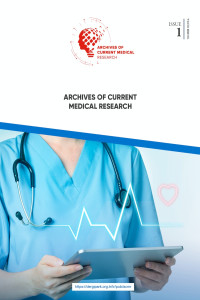Abstract
References
- 1. Portnoy, J., Waller, M., & Elliott, T. (2020). Telemedicine in the Era of Covid-19. The Journal of Allergy and Clinical Immunology: In Practice.1-3.
Abstract
Background: With the Covid-19 pandemic, those who care about working online from home office, computer and / or phone. it is aimed to pay attention to the use of telemedicine in the field of health and the attitudes of specialist physicians.
Methods: 85 specialist physicians participated in our research. The collected selection analysis was performed with the SPSS 22.0 program.
Results: Physicians working in internal sciences constituted 76.47% (n=65) of the study group. Among the matched branches, 24% (n=16) of clinical sciences consisted of pediatricians and their sub-branch physicians. 84.70% (n=72) of the physicians participating in the study did not perform video examination with telemedicine. Since it was only reviewed with telemedicine during working hours; 90.58% (n=77) of our study group stated that patients with at least 29 and below can be treated. During both face-to-face and telemedicine visual examinations, 83.52% (n=71) of our study group stated that a maximum of 9 patients could be treated by telemedicine. 85.88% of our study (percussion, palpation, auscultation) thought that telemedicine might be insufficient in evaluating the inspection user physical examination components. As for what precautions should be taken before telemedicine applications are popularized by the public, 83% of our physicians were supporters of the insurance company that wanted to intervene in helping the malpractice police. It should be considered as 76.47% (n=65) of our study group.
Conclusions: It is thought that telemedicine will facilitate the work of specialist physicians. However, more studies and data are needed before it can be used.
Keywords
References
- 1. Portnoy, J., Waller, M., & Elliott, T. (2020). Telemedicine in the Era of Covid-19. The Journal of Allergy and Clinical Immunology: In Practice.1-3.
Details
| Primary Language | English |
|---|---|
| Subjects | Clinical Sciences |
| Journal Section | ORIGINAL ARTICLE |
| Authors | |
| Publication Date | January 31, 2023 |
| Submission Date | May 1, 2022 |
| Published in Issue | Year 2023 Volume: 4 Issue: 1 |
Archives of Current Medical Research (ACMR) provides instant open access to all content, bearing in mind the fact that presenting research
free to the public supports a greater global exchange of knowledge.


